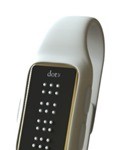Chris Meadows mentioned this below, but now comes a video of it in operation.
Intel reader for the blind – part 2 – video
AMAZON
A sad tale of Amazon monetization: eReaderIQ and the affiliate program
Courtesy of the Kboards, a worrying item about struggling e-book sites and their ability to monetize engagement with Amazon - or not - has...






























i realize that i’m braille-obsessed. and i know braille is growing less and less popular among the blind. but those who do not engage in the phonological re-coding analogous to reading with one’s eyes are failing to develop synapses that are important to brain development. what about a braille reader. a pinboard behind a flexible silicone membrane that will remain smooth when not in use, but read exactly the same files the rest of us do on our e-readers, but translates them into braille onscreen characters? notes could be handled in the same way; and a convention for underlining braille in a tactile way almost certainly already exists and i bet it could be ported to such a device. i could swear i read that someone was working on something like that.
i think we who can see sometimes take for granted the fact that we have complete control over the speed at which we read, and maybe view that as somehow optional to the process. i doubt that it’s optional for learning, and it certainly isn’t for the denser, more difficult material. if you ask any sighted person whether s/he would accept *any title of interest* in the audio format, they’d be likely to say no. audio is good for some things, but not for others; and blindness doesn’t change that fact. the idea that audio is the *ideal solution* for the blind seems to me misguided. at best, audio is better than nothing.
You are so right asphalt- audio is only one solution for accessing content.
Refreshable braille displays do exist. Unfortunately they tend to be very expensive.